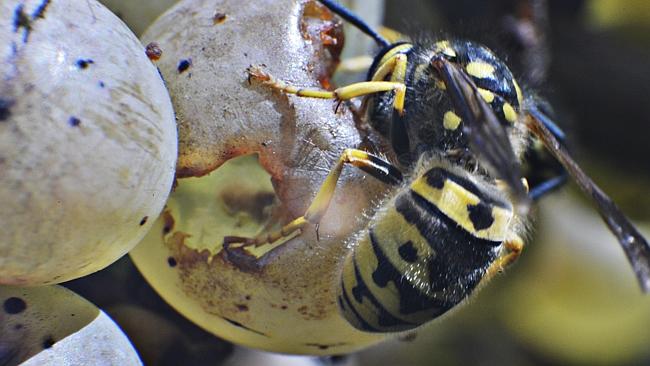European wasp in plague proportions in Adelaide Hills, as the winged scavengers cause nuisance at barbecues and cafes
ADELAIDE’S warm spring, summer and autumn has kept European wasps buzzing around barbecues and cafes, as numbers rise to plague proportions in the Hills.

SOUTH Australia’s warm spring, summer and autumn has kept European wasps buzzing around barbecues and cafes, as numbers rise to plague proportions in the Adelaide Hills.
Pest control companies say it is the worst wasp problem in recent years, as nest removal jobs go from five a week to 15, or more in some areas.
The University of Adelaide Australian Centre for Evolutionary Biology and Biodiversity’s Professor Andy Austin said the climate and food source in Adelaide had been good for wasps this season, which had kept numbers high.
“We didn’t have a really cold winter last year, which is when the hibernating wasp queens tend to die off,” he said.
“There is also good food source for the wasps, which means the nests are bigger and there are more out foraging.
“This year is bad, but it’s not unheard of. Some years we notice lots and lots of wasps around and other years there hasn’t been the right resources for them to establish good nests, so we don’t see as many.”
European wasps — or Vespula germanica — are scavengers, feeding on meat and fruit or rubbish.
They are attracted to sugary drinks and people drinking out of soft drink cans are being warned to use a straw or pour the drink into a glass.
Prof Austin said late summer and early autumn were the danger seasons for wasp attacks, but the numbers would reduce once winter hit.
“The numbers are at their highest now because the colonies have been around for so long,” he said.
“If we have a cold winter, wasp numbers will be affected next season.”
Eco Pest Control technical manager Gavin Hutton said the business had been run of its feet.
“We’ve increased from five jobs a week up to 15,” he said.
“The climate has been favourable to them (wasps), which has allowed the numbers to take off.
“We would probable collect eight to 10 nests a week at the moment … a lot of the time people see a few blowing around but that usually means there’s a nest close by.”
Murray Pest Control’s Trevor Scott said they had received most of their calls about wasps from the Adelaide Hills.
“There’s been a dramatic increase in the calls we’ve received from the Hills, the problem is really bad up there at the moment,” he said.
“This summer has been busier than it has been for a couple of years … wasps are more prevalent than they were in previous years.
“There’s a lot of resources around for them — good food and a good climate makes the perfect mix for numbers to increase.”
Victims of wasp attacks should immediately apply an ice pack to the sting and seek medical attention if an allergic reaction occurs.



